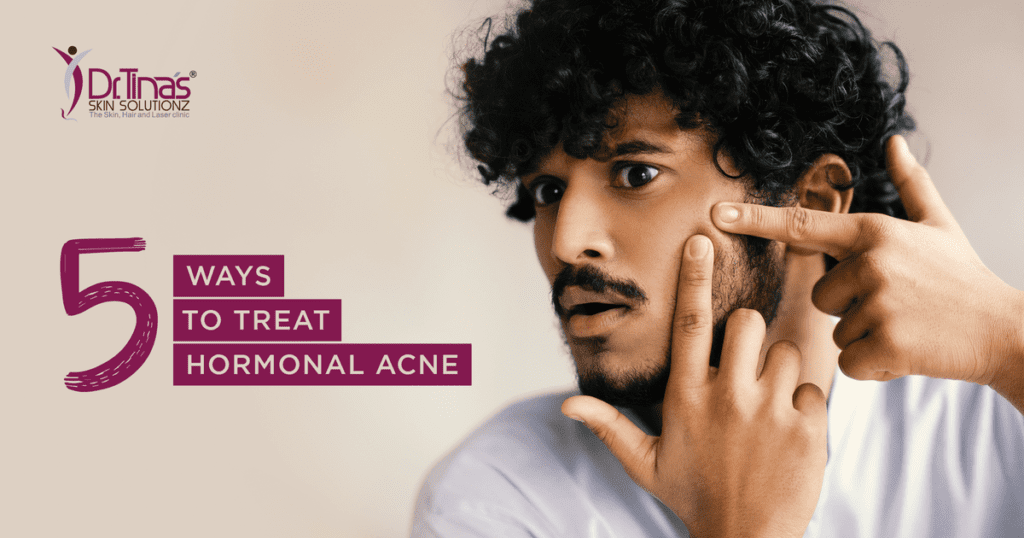5 Ways to Combat Hormonal Acne

Many people experience acne well into adulthood, even in their twenties, thirties, and beyond. This issue often stems from hormonal fluctuations within the body. Hormonal acne is particularly prevalent among women, affecting more than half of the female population. But what exactly causes it, and is it something that can be treated?
To answer the first question, hormonal acne primarily results from clogged pores due to excessive sebum production, which is driven by hormonal changes. These breakouts caused by hormonal shifts are indeed treatable!
If these measures fail to alleviate your acne, it might be time to visit a reputable and authorized clinic for the best acne treatment in Bangalore.
Exploring 5 Methods to Treat Hormonal Acne
Let's delve into five practical ways to manage hormonal acne effectively.
Identifying Lifestyle Changes That Truly Matter
Your current lifestyle habits might be contributing to your hormonal acne. Your daily routine can have a direct impact on your skin health. Your skin may serve as a reflection of your lifestyle choices. For instance, improving your gut health can significantly reduce acne symptoms.
Sleeping late or neglecting hydration can severely affect your skin, leading to various issues, including acne. Moreover, excessive stress can increase the production of cortisol, a hormone responsible for the body's fight-or-flight response. Elevated cortisol levels can result in weight gain and inflammation in the skin.
Mind Your Diet
The health of your gut often plays a crucial role in determining the condition of your skin—the largest organ in your body. Certain foods that trigger inflammation in your body can directly cause painful breakouts. High glycemic foods, with their high sugar content, can cause blood sugar spikes, leading to inflammation. Such foods not only cause inflammation but also stimulate excessive sebum production.
Low glycemic foods help maintain stable glucose levels in your body. Incorporating foods rich in Omega-3 fatty acids and antioxidants is often beneficial for skin health. While some studies suggest that specific meals can help with acne and skin health, there is no definitive dietary solution. Always consult your doctor before making any significant dietary changes to ensure they won't negatively impact your overall health. Consider adding green leafy vegetables, walnuts, almonds, and fish while avoiding dairy, gluten, and chocolate.
Establish a Proper Skincare Routine
Without a consistent skincare regimen, your skin is bound to suffer from issues like breakouts. Start with a good cleansing routine to remove excess oil, dirt, sweat, and makeup, providing a clean canvas for other skincare products to penetrate. It's essential to find the right cleanser suited to your skin type—something that isn’t overly harsh or drying.
To combat acne, you need to take proper care of your pores. Gently exfoliate to remove dead skin cells, minimize comedone formation, and smooth and soften your skin. Follow this with a moisturizer, even if you have active acne. Contrary to popular belief, hydrating your face does not worsen acne. Use a sunscreen appropriate for your skin type. Avoid home remedies such as lemon, soda, or toothpaste.
Recommended Reading: Why Home Remedies May Not Work for Acne?
Opt for Non-Comedogenic Makeup Products
If you have oily or acne-prone skin, choosing non-comedogenic makeup products is advisable, especially in summer. These products are less likely to clog your pores and may even reduce the likelihood of developing or worsening acne. While most oil-free products are also non-comedogenic, remember not to confuse the two terms, as they sound similar but aren’t identical. Not all non-comedogenic products are oil-free.
Oil-free means the product doesn't contain petrolatum, but it may still include other oils that are low on the comedogenicity scale and could potentially clog your pores. Non-comedogenic cleansers, creams, and cosmetics aren’t universally effective and can still cause acne. The density and composition of the product determine its impact on your skin. To play it safe, avoid emollients like acetylated lanolin alcohol, isopropyl isostearate, lauric acid, and other comedogenic ingredients.
Seek Professional Help from a Dermatologist
Over-the-counter treatments may not yield significant improvements for hormonal acne. This could be due to incorrect ingredients, dosage, or improper application. Additionally, if you have severe hormonal acne that is deeply embedded in your skin, topical treatments might not be effective at all.
Consulting a skincare professional will help you access the best acne treatment in Bangalore. As a general guideline, schedule an appointment with your dermatologist if your current treatment regimen hasn’t shown improvement after two weeks. A dermatologist can identify the root cause of your acne, run tests to pinpoint the exact issue, and recommend procedures such as carbon peels (which use laser-assisted gentle exfoliation), enzyme peels, medical-grade derma facials, and light therapy for acne. Acne extractions can also be beneficial if they are not too severe and are on the surface.
Hormonal acne can vary greatly from person to person. Therefore, it’s crucial to consult a skin expert to determine the best treatment tailored to your specific needs. Be patient and allow the medications or products to work their magic over a few weeks.

Dr. Tina Ramachander is one of the top dermatologists in Bangalore and serves as the Medical Director at Dr. Tina’s Skin Solutionz, a renowned skin care clinic in Bangalore. She holds a master’s degree in dermatology from the prestigious JJM Medical College in Karnataka and is now a practicing dermatosurgeon and Medical Cosmetologist in Bangalore.
Beef Flavored Seasoning,Strong Beef Flavor Seasoning,Beef Extract Nutritional Foods,Beef Bone Extract Extract Nutritional Food
Hunan Jiapin Jiawei Biotechnology Co. , https://www.foxfoodie.com
